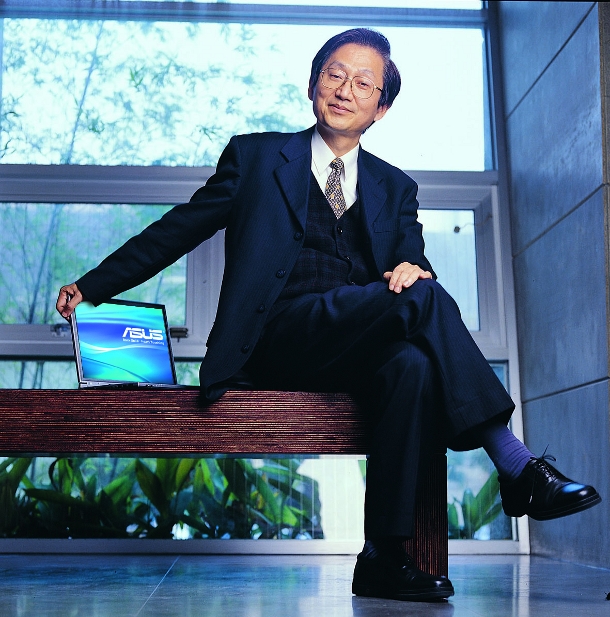Asus: What will be the next netbook?

Chairman Jonney Shih on tablets, smartbooks and laptops you can wear around your wrist
Eee PC maker Asus' chairman talks to silicon.com's Nick Heath about where the PC is heading, the Chrome OS-effect and why content must catch up for tablets to take off
Just over two years ago Taiwanese computer maker Asus released a lightweight, low cost device called the Eee PC.
With the seven-inch launch machine selling for $399 at a time when the average laptop sold for far more, the Eee PC made ultra-portable computing considerably more affordable for the average consumer.
In the first four months after its debut, Asus sold more than one million Eee PCs, spurring other computer manufacturers to release their own slimline machines and thus giving birth to the netbook market.
The price and portability of netbooks quickly won over consumers, with the form factor accounting for one tenth of laptop sales in EMEA in 2008 - and one fifth in 2009.
Global netbook sales for the year are expected to hit 25 million, with seven million of them likely to bear the Asus brand, making it clear the netbook is here to stay. The company's chairman Jonney Shih, voted a silicon.com Agenda Setter in 2008, spoke to silicon.com about what the else the future holds for portable computing - from plenty more netbooks to tablet PCs and smartbooks.

Chairman of Asus Jonney Shih
(Photo credit: Asus)
Tablets
Prototypes of tablet or slate PCs - touchscreen machines with no keyboards suited to watching media, reading e-books and web browsing - are sitting in Asus labs but Shih said the company is holding back on releasing any devices.
Asus' caution stands in marked contrast to some other tech heavyweights, such as Microsoft and HP, who recently announced a tablet device at the Consumer Electronics Show (CES), and Apple - if rumours it is about to release an 'iSlate' machine are to be believed.
Shih thinks it would be premature to release a tablet today and predicts the devices will not be successful until there are easily accessible online stores of books, music, videos, games and other content tailored to the form factor.
"Content is still not attractive enough today to the customer," he said.
"We have those kind of devices in our labs but we are watching to see when this is enabled."
He predicts a future where Apple, Google and Microsoft each provide major online content stores and web apps designed for touchscreen tablets.
Continues on page two…
Smartbooks
Asus' engineers are also working on smartbooks: low-cost, ultra-portable devices that are a blend of smartphone and laptop and typically come with always-on mobile connectivity.
According to research director at analyst house Gartner, Annette Jump, smartbooks won't start gaining popularity until at least 2011. Smartbook manufacturers will seek to minimise the cost of the devices by using a lightweight OS, such as Android or Google's forthcoming netbook OS Chrome, that require a modest amount of processing power and memory to run, she said.
But with the Windows OS and applications being so familiar to consumers, Asus' Shih is not convinced that consumers are yet ready to embrace a device that relies on a new OS.
Asus currently doesn't offer any Android netbooks but Shih agreed that as time goes on, Android will become the OS of choice for an increasing number of netbooks and smartbooks due to its low cost.
"If you look at Android you have a chance to think about [making the device] even cheaper," he said.
However, when Chrome OS launches at the end of this year, Shih added, it will supersede Android as a netbook OS, thanks to Chrome being designed for larger screens and supporting multiple windows.
For its part, Asus has netbooks and smartbooks running on Android and Chrome OS in its R&D labs, according to Shih, but is waiting until conditions are right to release them.
The Asus chairman can already see one barrier to the widespread adoption of Chrome-based devices, though: as they'll get their apps delivered via the web, running software will mean the user will need an internet connection.
"When people talk about cloud computing, unfortunately it's still not there yet," he said, adding however: "as time goes on you will see more advantage of being always connected."
Wearable devices
In the long term Shih expects today's netbooks and smartbooks to evolve into wearable, bendable and touch-sensitive screens with built-in computers - along the lines of the Waveface concept machines that Asus displayed at the recent CES trade show.
Shih said the devices, which he predicts will be available in five years' time, will have touch, voice and gesture recognition, with a view to creating simple and intuitive machines.
Waveface appears to reflect a shift in the focus among computer manufacturers in today's post-netbook era, away from simply churning out faster machines year-on-year and towards making computers more portable and easier to use.
Shih for one, welcomes the change: "I don't believe that the PC will keep evolving from simply [having] four core processors, to eight core to 16 core," he said. "I am tired of only thinking about the regular, dull PC roadmap."
The Asus Waveface Ultra concept computer
(Photo credit: Asus)